#Grizzly bears
Explore tagged Tumblr posts
Text
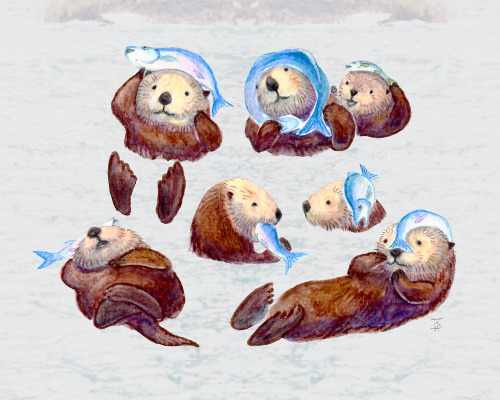
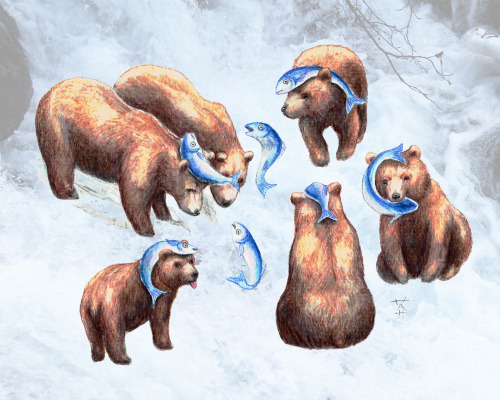


Salmon hats: sweeping the nation by storm watercolor on paper, digitally overlaid on photo
#watercolor illustration#dead salmon hats#orcas#killer whales#sea otters#grizzly bears#brown bears#women want me fish fear me
6K notes
·
View notes
Text

William Herbert Dunton (1878 – 1936). Crest of the Ridge, Grizzly. Oil on board.
Coeur d’Alene Art Auction
488 notes
·
View notes
Text

bearz...all of the bears.. (yes this is my first post hello..)
7K notes
·
View notes
Text
instagram.com
Tin Man Lee
570 notes
·
View notes
Text
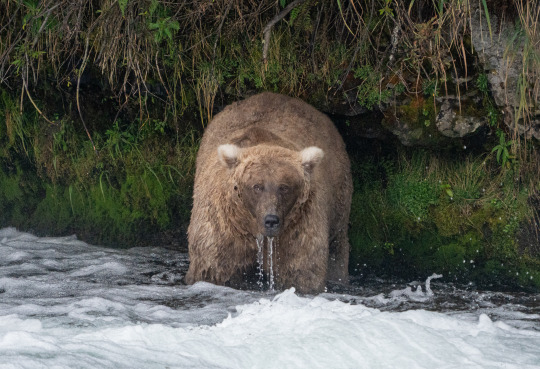
×,.·´¨'°÷·.. Happy Friday the 13th! ..·´¨'°÷·..× BEHOLD YOUR 2023 FAT BEAR QUEEN!
128 Grazer took the top spot, and we couldn't be more proud. All hail Grazer! Thanks for hanging with us. We appreciate you. Make your weekend amazing. 🤎 🐻 🤎
#fat bear week#fatbearweek#bears#grizzly#grizzly bears#katmai national park#katmai#alaska#alaska brown bear#friday#friday bear#outdoors#wildlife#cute#animals#grazer#128 grazer#queen#yass#chonk#big chonk
2K notes
·
View notes
Text
Quick bit of good news here! This decision is especially important because it acknowledges the need to reconnect disparate patches of bear habitat, rather than keeping separate populations in physical--and genetic--isolation. Brown bears need large territories, and once young bears are old enough to disperse they need to find territories of their own. That may mean venturing out of the species' strongholds and into adjoining areas.
But that is how a species recovers from near-extermination. We've already seen it with gray wolves dispersing back into historic territory on their own, and wolverines as well. By acknowledging the need for individual populations to mingle, we start building more support for wildlife corridors. These benefit not just the bears, but other species as well. And they create healthier populations overall, because not only do they have more habitat to thrive in, but they are no longer subject to genetic isolation and inbreeding depression.
This decision is far from the only protection the bears need. While defining the bears' overall recovery area, it also allows a rancher to shoot a bear, claiming that it was a danger to livestock. It's all too easy for a rancher to use that excuse to kill wildlife that was not actually threatening domestic animals, and ranchers have collected funds by claiming wolves or other wildlife killed an animal that in fact died by other means. So there is still work left to do, but I feel we should celebrate the fact that the bears will retain their ESA protection, and that this decision raises awareness of the need for larger, interconnected habitats instead of islands created by administrative boundaries.
#bears#grizzly bears#nature#wildlife#animals#ecology#environment#conservation#science#scicomm#wildlife conservation#endangered species#extinction#habitat restoration#restoration ecology#wildlife corridors#Endangered Species Act#charismatic megafauna#good news#hopepunk
77 notes
·
View notes
Text
Filler up! Winter is at hand.
10/24
69 notes
·
View notes
Text
Frontier myth vilified the California grizzly. Science tells a new story. (Washington Post)
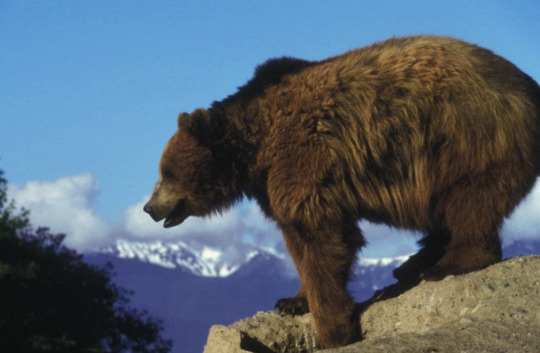
The grizzly, a subspecies of brown bear, has long held a place in mainstream American myth as a dangerous, even bloodthirsty creature. Its scientific name, Ursus arctos horribilis, means “the horrible bear.” But that image is being challenged by a new set of studies that combine modern biochemical analysis, historical research and Indigenous knowledge to bring the story of the California grizzly from fiction to fact.
In January, a team of experts led by University of California at Santa Barbara ecologist Alexis Mychajliw published a paper in the Proceedings of the Royal Society B about the diet of the California grizzly bear and how that influenced its extinction. The results challenge virtually every aspect of the bear’s established story.
“Pretty much everything that I thought I knew about these animals turned out to be wrong,” said Peter Alagona, an ecologist and historian at UCSB and co-author of the study.
Much of the grizzly bear’s long-standing narrative comes from stories, artwork and early photographs depicting California grizzlies as huge in size and aggressive in nature. Many of these reports, which found wide readership in newspapers elsewhere in the West and in the cities back East, were written by what Alagona calls the Californian influencers of their time.
“They were trying to get rich and famous by marketing themselves as these icons of the fading frontier,” Alagona said. “A lot of the historical sources that we have about grizzlies are actually not about grizzlies. They’re about this weird Victorian 19th-century celebrity culture.”
The team of ecologists, historians and archivists compared the image of California grizzlies from these frontier reports to harder data in the form of bear bones from museum collections all over the state.
The frontier myth had painted the California bears as larger than grizzlies elsewhere in the country, but the bone analysis revealed that they were the same size and weight, about 6 feet long and 440 pounds for the average adult.
In an even larger blow to the popular story of the vicious grizzly, the bones showed that before 1542, when the first Europeans arrived, the bears were only getting about 10 percent of their diet from preying on land animals. They were primarily herbivores, surviving on a varied diet of acorns, roots, berries, fish and occasionally larger prey such as deer.
As European-style farming and ranching began to dominate the landscape, grizzlies became more like the stories those frontier influencers were telling about them. The percentage of meat in their diet rose to about 25 percent, probably in large part because of the relative ease of catching a fenced-in cow or sheep compared to a wild elk.
Colonialism forced so many changes on the California landscape so quickly, affecting every species that the bears ate and interacted with, that the exact cause of this change will be difficult to ever fully understand.
Still, grizzlies were never as vicious or purely predatory as the stories made them out to be. The narrative of the huge killer bear instead fed a larger settler story of a landscape — and a people — that could not coexist with the settlers themselves. And that story became a disaster for more than just bears.
Although we will never have exact numbers, experts agree that hundreds of thousands of Indigenous people were living in what is now California before White settlers arrived. One frequently cited estimate puts the population at 340,000.
By 1900, that number had been slashed by more than 95 percent to around 16,000 surviving tribal members throughout the state. Eliminating the bear and the vast majority of California’s Indigenous people can be seen as parts of the same concerted effort to replace one landscape — and one set of stories — with another.
“The annihilation of the California grizzly bear was part of a much larger campaign of annihilation,” Alagona said. “I think it’s clear that what happened in California meets the legal definition of a genocide. But in a way, it was even more than that, because these were not just attempts to eliminate groups of people. These were attempts to destroy an entire world.”
187 notes
·
View notes
Note
bears but specifically when they stand on two legs

✅️ featherless
✅️ biped
Bears but specifically when they stand on two legs is a Man!
#behold! a man!#Bear#Bears#polar bear#bears in trees#Grizzly bears#Animals#wildlife#critters#fauna#Thanks tumblr for reccomending men loving men tags for this one
141 notes
·
View notes
Note
What's the difference between and ABC brownbear and a Grizzly?
hi, thanks for asking!
grizzly bears are a subspecies of brown bears! kodiak bears and european brown bears are also subspecies. "brown bear" is a broader category that includes several subspecies. geographical separation and location is the largest factor in determining the differences between subspecies of brown bear.
grizzly bears are one of the largest subspecies of brown bear (kodiak bears are the largest)! they live in north america and don't typically have access to as many coastal food sources as kodiak bears do, which means that they're usually smaller in size. while kodiak bears are coastal and have access to fatty salmon, grizzly bears live inland and rely more heavily on plant life and insects that they forage.
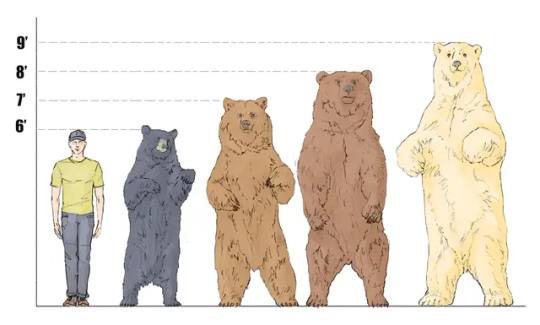
above is a diagram that illustrates the size difference. from left to right - black bear, grizzly bear, kodiak bear, and polar bear.
grizzlies live in alpine meadows, forests, and valleys. their fur has a 'grizzled' appearance - with darker roots and lighter tips - hence their name.


142 notes
·
View notes
Text
*No audio necessary it’s just kids babbling while the bears flail at each other
Mothers Day at the zoo today and the bears were very rowdy!
I was scoping the spot cause if we get married at the zoo we can set up by the bears and otters. It looked perfect, I need to follow up on that.
#ramblies#zoo#video#grizzly bears#before anyone asks…. yes these are the bears that ate the ducklings okay
94 notes
·
View notes
Text
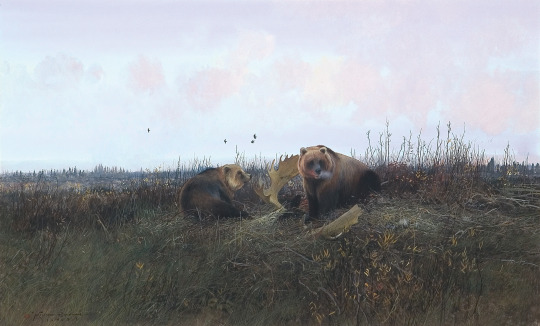
Michael Coleman (b. 1946), Grizzlies (1983), gouache on paper, 15 × 24.5 inches.
Coeur d’Alene Art Auction
736 notes
·
View notes
Text






#tv: frasier#frasieredit#frasier#niles crane#daphne moon#niles and daphne#heh#grizzly bears#i live a niles crane appreciation life#my huggle bunny and my rock#things i made
31 notes
·
View notes
Text

Stian Norum Herlofsen
97 notes
·
View notes
Text
FAT BEAR WEEK BEGINS TOMORROW!!!
#bear#friday#fridaybear#fat bear week#fat bear#Brooks River#katmai national park#katmai#katmai bears#alaska#grizzly bears#grizzly
865 notes
·
View notes
